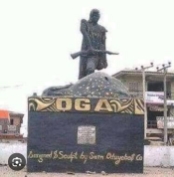
Residents want government to stop day time ‘Oro Festival’ in Ikorodu
CITIZENS COMPASS– Some residents of Ikorodu, Lagos State, on Thursday, appealed to the state government to stop activities of ‘Oro’ festival during the daytime.
They want the government to restrict the festival to nighttime to prevent restriction of movement particularly that of women and non indigenes.
The residents disclosed this in interviews with the News Agency of Nigeria, lamenting that the cultural practice infringes on the rights of citizens—particularly women—and negatively affects economic livelihoods.
‘Oro’ is a festival that restricts movement of women on certain days.
The Oro festival is a traditional Yoruba celebration observed only by male descendants who are native to the town.
During the festival, tradition forbids women and non-natives from being outdoors or witnessing the Oro, with death cited as the penalty for any violation.
NAN reports that the annual Liwe Oro festival is taking place in Ikorodu Town.
Mrs. Bukunmi Taiwo, a septuagenarian who has lived in Ikorodu for over 40 years, called for dialogue and community engagement to ensure that cultural observances benefit all residents without creating undue hardship.
The world is changing, and our beliefs and practices must adjust accordingly for social harmony,” she said.
“Many families rely on daily earnings from petty trade. The imposition of curfews during Oro festivals places a heavy burden on already struggling households. I appeal to the Oro adherents to restrict their activities to midnight so residents can move freely and go about their livelihoods.”
Obinna Nweze, a trader at Ladega Market, expressed frustration over the frequent closure of markets in the town.
“This year alone, the market has been shut more than five times—twice for the Oro festival, others for the Kabiyesi celebration, the Iya Oloja program, or for mourning someone’s death.
“You dare not open your shop because miscreants may harass or loot it. It’s emotionally and economically draining. We are just trying to survive.”
Legal practitioner Mr. Mustafa Mohammed emphasised the supremacy of the Nigerian Constitution, urging government action.
“Every citizen is entitled to fundamental rights, including freedom of movement. It is unacceptable that women and girls still face restrictions due to cultural practices. The government must intervene to ensure that no tradition overrides the rights and freedoms guaranteed by law.”
Mrs. Cecilia Oluwadarasinmi, a gender advocate also voiced concern, noting that over 85% of women in Nigeria are active in the informal economy.
Although today coincides with June 12, a public holiday, the core issue is the curfew imposed by the Oro festival.
Just last month, the Magbo Oro festival fell on Children’s Day, denying many children—especially girls—the chance to celebrate.
While cultural preservation is important, it must not come at the expense of public welfare or gender equality.”
She stressed the importance of inclusive cultural practices to foster cohesion, economic empowerment, and sustainable development while reducing gender-based discrimination.
NAN reports that the Oro festival is held twice annually in Ikorodu Town—typically in May and June—with neighbouring communities like Igbogbo, Imota, and Agbowa holding theirs in separate months.
Despite its controversial nature, the Oro festival remains a significant tradition in Yoruba culture. Its adherents say it serves as a spiritual exercise to maintain peace, bring blessings, and cleanse the community
of evil.
—NAN







